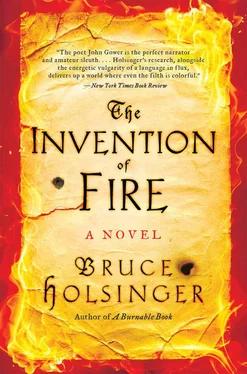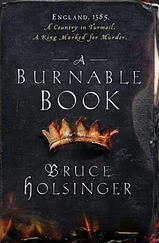Bruce Holsinger - The Invention of Fire
Здесь есть возможность читать онлайн «Bruce Holsinger - The Invention of Fire» — ознакомительный отрывок электронной книги совершенно бесплатно, а после прочтения отрывка купить полную версию. В некоторых случаях можно слушать аудио, скачать через торрент в формате fb2 и присутствует краткое содержание. Год выпуска: 2015, Издательство: HarperCollins, Жанр: Исторический детектив, на английском языке. Описание произведения, (предисловие) а так же отзывы посетителей доступны на портале библиотеки ЛибКат.
- Название:The Invention of Fire
- Автор:
- Издательство:HarperCollins
- Жанр:
- Год:2015
- ISBN:нет данных
- Рейтинг книги:3 / 5. Голосов: 1
-
Избранное:Добавить в избранное
- Отзывы:
-
Ваша оценка:
- 60
- 1
- 2
- 3
- 4
- 5
The Invention of Fire: краткое содержание, описание и аннотация
Предлагаем к чтению аннотацию, описание, краткое содержание или предисловие (зависит от того, что написал сам автор книги «The Invention of Fire»). Если вы не нашли необходимую информацию о книге — напишите в комментариях, мы постараемся отыскать её.
The Invention of Fire — читать онлайн ознакомительный отрывок
Ниже представлен текст книги, разбитый по страницам. Система сохранения места последней прочитанной страницы, позволяет с удобством читать онлайн бесплатно книгу «The Invention of Fire», без необходимости каждый раз заново искать на чём Вы остановились. Поставьте закладку, и сможете в любой момент перейти на страницу, на которой закончили чтение.
Интервал:
Закладка:
This was the story she told them, to some moist eyes and pats on the hand, for how could she tell them her true tale, the sum of all that had brought her here?
A husband may do what he wishes with the flesh and flower of his wife. Walter had always liked to remind her of this, quoting canon law as he smacked her face, broke her ribs, ruined her inner flesh front and back, and it seemed that was the only sentence of the church’s decretals that meant anything to him. He’d had two years at Oxford in his bachelorhood, failed miserably reading theology, then he returned to Kent to suck once more at the small teat of his father, a gentleman of modest means albeit well respected in the shire-despite his wastrel of a third son. By the time Walter married her he’d become a bitter, sullen man, often drunk, full of foul smells and ugly noises. From the start he had treated her like one of the deer carcasses brought back from his slovenly hunts. There had been no escape, it seemed. Until there was.
Margery felt a hand press her arm. It was Constance, leaning against her. “Bear up, dearest. Eleven children I bore, and but six live now, the rest sleeping with God. It is our woman’s lot, such suffering, daughters of Eve as we are. St. Cuthbert will comfort your soul, you shall see.”
“Aye, he will that,” said her sister, Catherine, with a pious nod, and a sober quiet settled around the board.
The men, hearing nothing of the exchange, were as loud as they liked, relieved to be off their tails for the day, installed around a table with ample ale to dip and share from the common cask. As the women resumed their own conversation she caught his eye, as a wife does, smiled openly at him in the candlelight. His own eyes widened in surprise, thrilled her with a gleam of unspoken want.
Over the following hours the room filled with villagers, there to mingle with the pilgrims passing through, and to hear the news from London and beyond. A large crowd, at least forty strong. Out here there was little of the rough trade she’d heard was common in the city taverns. In London a gentlewoman like her would not be seen in such a place, yet here she felt unobtrusive, welcomed by the diverse company.
Margery found herself more at ease that evening than she had felt for many months. Robert seemed content as well, happily playing the lower gentleman’s part, drinking neither too much nor too little, affecting an air of light condescension toward men who were surely his betters. He was easing into this strange role circumstance had forced on him, and playing it well.
Someone in a far corner began to sing. A ballad from the north country, one she had never heard, and a dark song it was, with a haunting, warbling tune that matched the eerie matter.
Sir Aldinger, steward to King Henry, is smitten with Queen Eleanor, who refuses his advances. Furious and ashamed, Sir Aldinger vows to watch her burn. That very day a leper, on the verge of death, limps into town. Sir Aldinger, seized with a plan, lifts the sick man onto his back and carries him into the castle, promising him his health will be restored if only he will obey the steward’s commands. While the queen sleeps, Sir Aldinger places the leper in her bed, swearing him to silence, then rushes off to find King Henry. The king, upon being led to his wife’s bed and spying his queen lying with a leper, pronounces a sentence of death upon the corrupt lovers.
A pair of new gallows shall here be built,
Thou’ll’st hang on them so high.
And a fair fire beneath be lit,
To burn our queen thereby.
The sentence sent a thrill through the assembly, all eager to learn how the queen would elude noose and flame. Sensing the ardor of their audience, the singers slowed, hummed, mouthed a string of lee-dee-la s and lee-dee-loo s in place of words, dilating the story as long as the company would tolerate before relenting.
They had begun the next verse- Forth then walked our comely king, to meet our comely queen -when the outer door burst open.
There was a shout of alarm in the courtyard, the scuffle of feet on dirt, then six strangers clambered through the inn’s door. Two of them bore a child in their arms, a boy of seven or eight. The nearest table was cleared, the boy stretched on the board, water and cloth requested by one of the men who had carried him within. She could see little, as she sat on the far side of the room, though she could hear the low moans. She caught a glimpse of the boy in the candlelight, his dirt-streaked face divided by a deep and oozing gash.
As three village men rushed off to ride for the nearest surgeon, the story was quickly told. Another, smaller group of pilgrims, a Kentish fellowship from Canterbury, had been riding along the highway, bearing for this very inn. They reached the outskirts of the village later than they had intended, and just before emerging from the woods were set upon by a gang of brigands in the night. Though the thieves were well armed, one of the company, the father of the wounded boy, had resisted, drawing on the band of criminals and provoking them to unsheathe their short swords and assault the would-be defender.
A brief but vicious struggle ensued, bags and purses violently cut and seized by the brigands, ending only when the man’s son, mounted before his mother, leapt down from his horse, raced to his dying father’s side, and received slashes to the neck and face for his troubles. The boy’s screams had frozen both companies in place, until the shame of an injured child caused the brigands to flee with their spoils-including two of the victims’ horses.
The father’s body had been thrown over a remaining horse, the rest of the company double mounted for the last push to the village. Now the mother, this new widow, stood leaning over her son’s prostrate form, weeping for his wellness. In low voices everyone began to describe his worst wounds seen, suffered, or tended. All had witnessed much worse than this, as the slash to the boy’s face was shallower than it had at first appeared, and it was generally held that he would survive.
The talk then turned to the conditions of the highway. Some recounted prior incidents of robbery, others cursed the sheriffs for inadequate patrolling, though all agreed that it was best to leave even the safest of the king’s roads well before nightfall.
The boy stirred on the table. She heard a cough. He asked for drink, prompting sighs of relief. The mother collapsed against a bench, and the keeper’s wife directed two other women to help remove her to a room. As the distraught company settled into the relative safety of the inn the subdued chatter resumed.
Once the room had calmed, Robert stood to leave, swishing past her back. She watched him go out a side door, to the privy, she assumed. In a few moments he returned, though not to his table. As he slipped past her he placed his hands briefly on her shoulders, then went to the hearth. He stood there, unmoving.
She felt his stare but could not return it, afraid she would betray how it had moved her, this new firmness of his touch. Finally she turned her head, looked straight at him, her eyes blazing with invitation-and saw the fear in his own. His face was ashen and drawn.
The sounds around her faded. She heard only the pulse in her ears as she rose slowly from the table and walked to him, feigning unconcern. She touched his hand.
“What is it?” she whispered.
“We must go, Elizabeth.” His voice was soft, barely a whisper. His neck was bent, his lips just inches from the hollow of her neck. She felt it throb with his nearness. “That mother.”
“What about her?” she said.
“I had to see her more closely to be sure. I went back to the rooms. She was there, with her son. I saw her face in the candlelight.” His voice caught. “Now I am sure.”
Читать дальшеИнтервал:
Закладка:
Похожие книги на «The Invention of Fire»
Представляем Вашему вниманию похожие книги на «The Invention of Fire» списком для выбора. Мы отобрали схожую по названию и смыслу литературу в надежде предоставить читателям больше вариантов отыскать новые, интересные, ещё непрочитанные произведения.
Обсуждение, отзывы о книге «The Invention of Fire» и просто собственные мнения читателей. Оставьте ваши комментарии, напишите, что Вы думаете о произведении, его смысле или главных героях. Укажите что конкретно понравилось, а что нет, и почему Вы так считаете.












